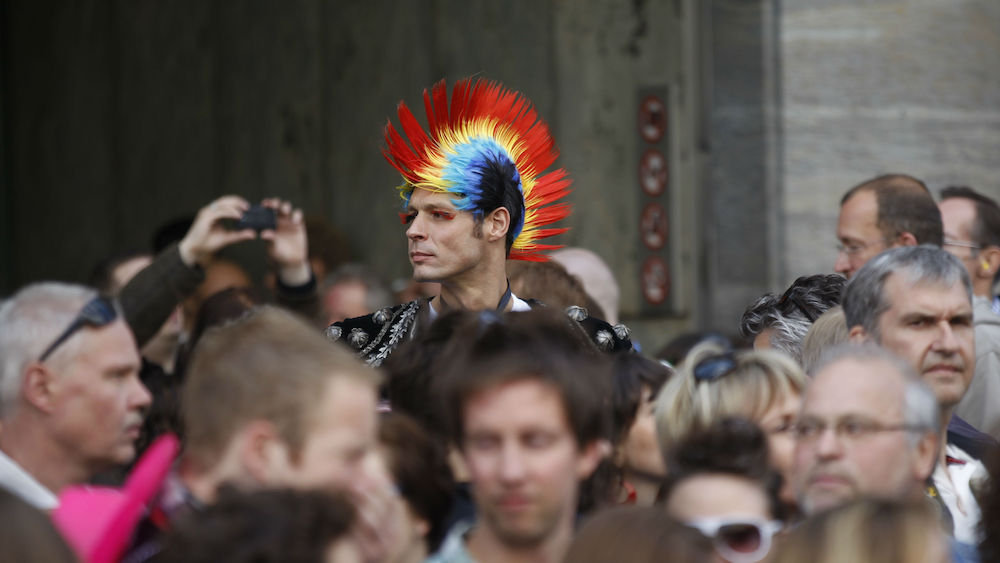Fifteen years ago, Berlin enacted a sort of “gay marriage lite”: the eingetragene Lebenspartnerschaft offered same-sex couples many of the same rights and privileges married couples enjoyed. But under Chancellor Angela Merkel, further improvements have been in short supply, and other countries have left Germany behind.
On a sunny day in 2001 I was in the town hall of Berlin’s Schöneberg district to see Germany’s first gay couple say “I do.” The two men in their late 50s wore matching cream suits and clutched each other, along with a heart-shaped cushion on which their rings rested.
Theirs was the first same-sex registered partnership in the country, taking advantage of a law passed by Gerhard Schröder’s Social Democrat-Green coalition. Though it wasn’t full marriage, it was a big step that gave same-sex couples many of the same rights and privileges.
Despite the worst predictions of right-wing conservatives, social order didn’t collapse that day as the happy couple headed for lunch with friends in a nearby restaurant. That day it seemed to me that Germany was light years ahead of my native Ireland on things like gay rights.
But times change. Last year Irish voters backed a constitutional amendment opening marriage to all adults, regardless of sex. In the 12 months since, around one or two same-sex couples a week have gotten hitched, and – guess what? – social order hasn’t broken down.
For those who remember good Catholic Ireland, it’s an extraordinary shift. For me, however, it is just as extraordinary to think that my homeland has now left Germany in its dust.
A decade of Angela Merkel and two grand coalitions may have been good for German stability, but they’ve been bad for the country’s progressive reputation. That much was painfully clear earlier this month when Germany’s anti-discrimination authority presented a report on the notorious paragraph 175 of Germany’s criminal code, which originated in 1872 and forbade homosexual acts among men. It was tightened up further by the Nazis in 1935, increasing prison sentences to up to ten years.
Remarkably, post-war Germany, both East and West, carried over that Nazi-era law into their own statute books, resulting in an estimated 140,000 convictions in total. Men convicted of illegal homosexual acts often lost their jobs and homes. Many took their own lives. East Germany abolished its version of the law in 1968, West Germany watered it down in 1969 but only abolished it completely in 1994. Since then the Bundestag has negated all paragraph 175 convictions from the Nazi era, but not the post-war convictions.
For Christine Lüders, head of Germany’s anti-discrimination authority, this is an intolerable state of affairs. The paragraph 175 convictions, she said, impinge on “the core of human dignity” of those affected and should be annulled. Germany’s federal justice minister, Heiko Maas, was quick to agree, saying these old judgments “have violated in a deep way the core of every convicted person.”
Which is lovely to hear, but begs the question: why hasn’t Berlin acted before now?
Maas’ foot-dragging fits a depressing pattern in Germany. There have been improvements to the gay civil unions bill of 2001 – but only after the German government fought, and lost, in court. Berlin agreed to improved adoption and fostering rights after a couple sued, though still refuses to offer adoption equality for gay couples. Similarly, Germany extended to gay couples tax privileges previously reserved for married couples – but only when forced to do so after Germany’s highest court found previous distinctions were unconstitutional.
According to a ranking by the International Lesbian, Gay, Bisexual, Trans and Intersex Association, a lobbying group, Germany now ranks 16th in Europe on gay rights – not because things have gotten worse for gay people, but because so many other countries have moved on ahead.
Ask German Social Democrats about their foot-dragging on gay rights and they point to their Christian Democratic Union (CDU) coalition partner. Ask CDU leader Angela Merkel and she says she has no political majority in her party to push for marriage equality. It’s not clear, though, what majority she means: A recent YouGov poll showed that two thirds of Germans backed marriage equality, including 61 percent of CDU voters.
On gay rights, Angela Merkel is as out of step with her voter base as Germany is with the rest of Europe – a sad state of affairs for the country that, a century ago, gave the world the modern gay rights movement.







